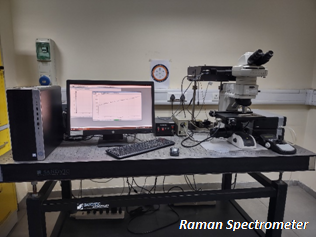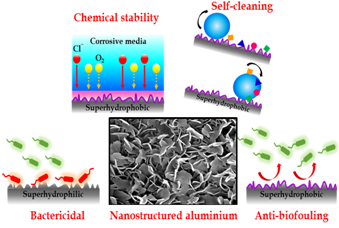Ministry of Science & Technology
Nano-structured self-cleaning aluminium surface that reduces bacterial growth can be useful for biomedical & aerospace applications
Posted On:
28 JUL 2021 7:19PM by PIB Delhi
A group of researchers have recently developed a nano-structured self-cleaning sustainable aluminium surface by utilizing a simple and environment-friendly fabrication route. It could have multiple applications ranging from biomedical to aerospace and automobiles to household appliances, and the process is easily scalable to industrial-level production.
Aluminium is a light metal, which has many industrial applications as it can be easily cast, machined and shaped. However, atmospheric degradation due to the accumulation of contaminants and humidity significantly limits its performance and sustainability. Besides, the leaching of aluminium also causes environmental and health-related issues.
To overcome these problems, Dr Harpreet Singh Grewal, Dr Harpreet Singh Arora and Mr Gopinath Perumal, researchers from the Department of Mechanical Engineering and Dr Sajal Kumar Ghosh and Ms Priya Mandal from Department of Physics of Shiv Nadar University, Delhi-NCR have jointly developed the nano-structured aluminium surfaces that show immense mechanical, chemical, and thermal durability restricting the corrosion and leaching effects. A Raman spectrometer obtained through the ‘Fund for Improvement of Science & Technology infrastructure’ (FIST) project of the Department of Science & Technology, Government of India, has been used to carry out this work. This result is reported in the Journal of Cleaner Production.
The researchers have developed a flake-like nano-structure on aluminium surface. This is achieved by heating the aluminium sample in water with a temperature maintained at 80oC for an hour, without using any chemical reagents and toxic solvents. The surface obtained by this facile and environment-friendly approach showed a complete wetting nature (ability of a liquid to spread over a solid surface). A coating of low surface energy hydrocarbon material on it converts it into a surface where a water droplet immediately rolls off the surface. This makes it useful for self-cleaning applications.
“This self-cleaning surface is stable over a wide range of temperature, from -80 to 350oC, improving its corrosion resistance property. In fact, it shows 40 times reduction in the corrosion rate when compared to the existing surfaces developed by other processing routes,” said Dr Grewal.
Dr Ghosh explains that because of their nanostructured morphology coated with hydrocarbons, these surfaces are capable of reducing bacterial adhesion and growth to a great extent and hence can be used in healthcare and medical devices, including dental implants and heart assistive devices.

Fig: Diagrammatic representation of the mechanism of the developed surface

Fig: Raman spectrometer obtained through (FIST) project
<><><><><>
SNC/TM/RR
(Release ID: 1740024)
Visitor Counter : 1437